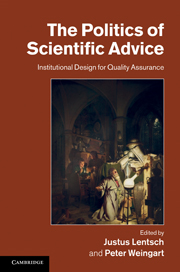Book contents
- Frontmatter
- Contents
- List of figures
- List of tables
- Acknowledgements
- Biographical notes
- Part I Methodological issues: quality control and assurance in scientific policy advice
- Part II Collegial science advisory bodies
- Part III Collegial science policy advisory bodies
- Part IV Research-based advisory organisations
- Part V Academies of science
- 17 Scientific advice for policy in the United States: lessons from the National Academies and the Former Congressional Office of Technology Assessment
- 18 Quality control in scientific policy advice: the experience of the Royal Society
- 19 European Academies Science Advisory Council (EASAC)
- 20 Quality control in the advisory process: towards an institutional design for robust science advice
- Index
- References
19 - European Academies Science Advisory Council (EASAC)
Published online by Cambridge University Press: 25 October 2011
- Frontmatter
- Contents
- List of figures
- List of tables
- Acknowledgements
- Biographical notes
- Part I Methodological issues: quality control and assurance in scientific policy advice
- Part II Collegial science advisory bodies
- Part III Collegial science policy advisory bodies
- Part IV Research-based advisory organisations
- Part V Academies of science
- 17 Scientific advice for policy in the United States: lessons from the National Academies and the Former Congressional Office of Technology Assessment
- 18 Quality control in scientific policy advice: the experience of the Royal Society
- 19 European Academies Science Advisory Council (EASAC)
- 20 Quality control in the advisory process: towards an institutional design for robust science advice
- Index
- References
Summary
Introduction: contribution of science to European policy-making
Different countries vary in the way that scientific advice is used by public policymakers (Weingart and Lentsch 2006). Governments often constitute and manage their own scientific advisory bodies as a function of the executive arm of government. This internal function has been increasingly complemented by the independent activity of national academies of science helping their national governments access science (Collins and Lindberg 2002). In member states of the EU, many academies have developed an effective relationship with national governments in advising on the scientific dimension in policymaking. Until recently, the development of an analogous relationship at the EU level (with the European Commission, Parliament and Council of Ministers) has been more challenging, although academies recognised that the scope of their advisory functions needed to extend to cover the European level and that their effectiveness could be maximised by collective activity. Several different bodies have now come into being within a relatively short period to offer scientific advice at the EU level (Fayl and Kyriakou 2002) in addition to those actually created by the EU institutions, indicating ‘how widespread is the perception that alongside their official policy-advice structures, the main organs of the European Union need independent advice about science’ (Collins and Lindberg 2002). Rogers in Chapter 7 and Podger in Chapter 12 of the present book provide examples of the challenges faced and the criteria used when EU policymakers take account of scientific advice.
- Type
- Chapter
- Information
- The Politics of Scientific AdviceInstitutional Design for Quality Assurance, pp. 342 - 352Publisher: Cambridge University PressPrint publication year: 2011
References
- 1
- Cited by



